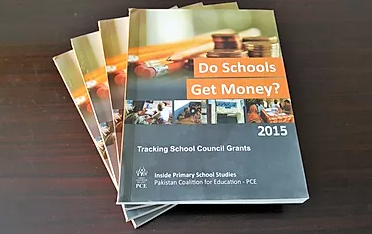Disclaimer: Website Under Maintenance: Our website is currently under maintenance. We apologize for any inconveniences.
Pakistan Coalition for Education launched its seminal budget tracking study, “Do Schools Get Money?” in 2014. The first year, the report was piloted across three districts, the second report was based on the findings of 24 districts and third year the study covered 14 districts of Pakistan. The study was aimed at providing a viable and sustainable solution to the current accountability challenges since it directly connects the duty bearers, service providers and the right holders. The broader aim of the effort was to provide the citizens’ group with critical data that would not only build awareness about how public funds are being spent- specifically within the education sector- but also help promote the use of evidence in local planning and decision making
PCE is continuing to explore aspects of social accountability and expanding its scope of work with its research and advocacy efforts. The budget tracking study has been effective in providing the government officials as well as the local community members an enhanced understanding of school management committees and how they function on the district level. Through this study, key stakeholders can develop an increased understanding of district budget allocation to schooling, utilization of that budget and the decision-making behind the allocation and utilization.

Pakistan's education spending is currently lowest in South Asia. With only 2.5% of GDP allocated to education, the focus needs to shift from recurring budget to development budget. Many schools lack basic amenities and facilities such as clean drinking water, proper sanitation, boundary walls and learning aids for students that contribute towards low enrollment and high drop rates. PCE initiated “Fund the Future: Education Now” campaign seeking increased domestic financing for education. Letters were disseminated to Provincial Chief Ministers, Finance Ministers and Education Ministers thereby taking all relevant stakeholders on board. The campaign was rigorously taken up on social media as well, seeking time bound and credible pledges from the Pakistan government regarding increased financing of education. In brief, campaign aimed to secure the following:
| 1 | Time bound and credible pledges to increase education spending to 4-6 % of GDP in line with SDG 4 and/or increase spending to 20% of total government expenditure on education by 2020 |
| 2 | Expand tax bases through tax reform and tax justice by challenging tax avoidance, tax evasion and raising new earmarked taxes |
| 3 | Ensure equity in education by prioritizing sensitive allocation and spending to support marginalized groups |
| 4 | Improve data on education financing and ensure a pledging baseline to ensure that all pledges can be monitored, tracked and measured |
| 5 | Transparency in budgeting and increasing scrutiny of education spending |